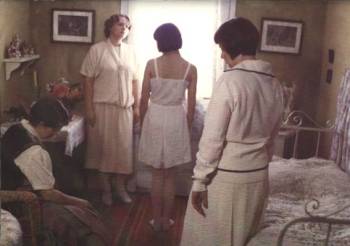 | ||||||||||
Panny z Wilka[The Maids from Wilko]
 fot: Renata Pajchel |
Luckily, I have never been crazy about politics in film. It is the cinema and its special world which I love and where I seek personal fulfilment. That is why I have often also filmed stories without current political import.
The story The Maids from Wilko had been on my mind for a long time. The idea sprang up following the success of The Birch Wood at home and abroad. Yet the final decision was also motivated by political necessity. After producing the politically charged Man of Marble it seemed advisable to put the censor off the scent for a while.
But while allowing the film bosses to breathe a sigh of relief, the decision turned my life into a nightmare. The last two, or rather three, films I made - starting with Promised Land - were made at a hectic pace, which unfortunately made itself felt in the outcome. However, the delicate fabric of The Maids from Wilko required an entirely different approach. As a result, the greatest difficulty I experienced when making this film was the conflict between my inner pace and the slow pace of the story.
It was my wife Krystyna, seriously alarmed by my nervous condition, who finally made me understand that I was still moving in the rhythm of my previous film, Man of Marble, that is at a rapid pace, specific to a political film, which, by its very nature, is based on action, whereas now we were dealing with entirely different material...
From that moment on the work started to flow quite naturally, matching the languid rhythm of the lives of the Wilko women. At last it was possible for me to study their faces, to contemplate the sun filtering through the green fronds overhanging the porch, to enjoy the soft outlines of the landscape, and to observe the daily household activities, including those in the pantry, so beautifully reconstructed by Krystyna Zachwatowicz.
When I ask myself what The Maids from Wilko is about, the best answer I can find is that it deals with all sorts of things one cannot clearly define... There is a very fine thread connecting us with the story, as if we were trying to retrieve something precious and long lost, the happier memories of our bygone childhood days. What the film reveals is a world rooted in a clearly defined system of values. The women in the film know very well what is not allowed, where one has to stop. But it was by no means easy to convey this on the screen.
Andrzej Wajda
Reviews
One can feel Chekhov's presence (...)
O Slavs! All it takes are a few men and women still enjoying some privileges but already relegated to oblivion, living on the banks of the river of life! A few unhappy souls who love but are unloved! And the sweetness of a new spring, the hypnotic spell of a bygone summer, tenderness in vain, and unexpressed despair. Also, birdsong (an oriole, as is often the case in Poland), of which one cannot say whether it opens the gates of hope, or closes them. (...) It is sad, beautiful and poetic. Yes, poetic, in the now often contested but irreplaceable meaning of that beautiful word - poetry.
Claude Mauriac
"V.S.D.", Paris, 31 May, 1979
Andrzej Wajda's growing talent becomes most evident when he enters territories, which are new to him. Wajda begins to stir our emotions. Previously, he fascinated, shocked, and thrilled. But this time he has touched my feelings. Yes, I was deeply moved by The Maids from Wilko. After seeing the film for a second time, I felt even more deeply moved. And the third viewing only intensified this reaction. (...) It seemed as if the film-maker, known so far for his tendency to attack the viewer with as much expressive force as possible, had decided to test his expressive powers, reduced to only one range - the treble key - in order to see if he could still be the master of our imagination. And he has carried out this experiment by making The Maids from Wilko.
Jerzy Plazewski
"Kultura", Warsaw, 23 September, 1979
The motif of the transitory character of life is more conspicuous in Wajda's film than in the original story. Some of its subtleties have vanished. Such departures are unavoidable. Things barely suggested by the narrative, the retrospective or the descriptive parts of the story, had to come to the foreground in the film. Similarly, literary characters had to become full-blooded people. Tunia had to fall in love with Wiktor; and Wiktor's uncle, originally a fairly conventional old fellow, has to die a painful death. As a result, TheMaids from Wilko came to symbolise all the girls we once loved, and who seem to us, when we meet them again after many years, so mysteriously changed as to be nearly unrecognisable.
Aleksander Jackiewicz
"Zycie Warszawy", Warsaw, 13 October,1979
This film is available at the Merlin bookstore
Jaroslaw Iwaszkiewicz's story Panny z Wilka is available at the Merlin bookstore
Oscar | Films | Theatre | Why Japan?
Favourites | Pictures gallery | About Wajda | Bibliography
Main Page | Search | Wersja polska
Copyright © 2000 Proszynski i S-ka SA. All rights reserved